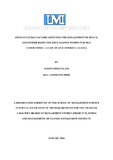| dc.contributor.author | AGEDO, Immaculate | |
| dc.contributor.author | Bakibinga, Florence Sajjabi(Supervisor) | |
| dc.contributor.author | Namara ), Rose(Supervisor | |
| dc.date.accessioned | 2017-07-19T09:28:22Z | |
| dc.date.available | 2017-07-19T09:28:22Z | |
| dc.date.issued | 2016-01 | |
| dc.identifier.citation | APA | en_US |
| dc.identifier.other | 13/MMSPPM/30/048 | |
| dc.identifier.uri | http://hdl.handle.net/20.500.12305/199 | |
| dc.description | A Dissertation submitted to the Higher Degrees Department in partial fulfillment of the requirements for the award of the Master’s Degree in Management Studies (Project Planning and Management) of Uganda Management Institute | en_US |
| dc.description.abstract | The study established the effect of socio-cultural factors on the Management of Sexual and Gender Based Violence (SGBV) against women in Apac District, of Uganda. The specific objectives of the study were: to assess the extent to which bride price practices affects Management of Sexual and Gender Based Violence against women in Apac District; to explain the effect of cultural norms on Management of Sexual and Gender Based Violence in Apac District; and to establish the extent to which the moderating effect of the composition of LC courts affect the management of sexual and gender based violence against. Literature on socio-cultural and management of SGBV was reviewed. A case study research design was used supplemented by both qualitative and quantitative approaches. An accessible population of 320 elements was used to determine a sample size of 175 respondents. A 71% response rate was obtained. Key findings of the study include a positive significant relationship result for bride price practices (.355**), cultural norms (.580**) and composition of LC courts (.514**) on management of sexual and gender based violence.
The study concluded that SGBV acts led to splitting of more families. Fewer women reported domestic violence and women beaten were psychologically tormented and rarely were men apprehended when they beat their wives. However, many community members were not aware of violence in homes. Many women eloped as a result of domestic violence and many were isolated and neglected. Fewer LC courts adhered to a predefined mechanism, many women were dissatisfied with the court set up and injustice prevailed. The study recommends that locally guidelines for payment of bride be formulated, use ceremonies such marriage and naming ceremonies to deliver SGBV information and informing communities that SGBV was punishable under the laws of Uganda. There is need to introduce a women’s desk for more work coordination, need to form a task force to review LC court composition and ensure a fair community evaluation exercise on the role played by the LC courts. | en_US |
| dc.language.iso | en | en_US |
| dc.publisher | Uganda Management Institute | en_US |
| dc.subject | Socio-Cultural | en_US |
| dc.subject | Management of Sexual and Gender | en_US |
| dc.subject | Violence against Women | en_US |
| dc.subject | Rural Communities | en_US |
| dc.subject | Apac District | en_US |
| dc.title | Socio-Cultural Factors affecting the Management of Sexual and Gender based Violence against Women in Rural Communities - A case of Apac District, Uganda | en_US |
| dc.type | Book | en_US |

